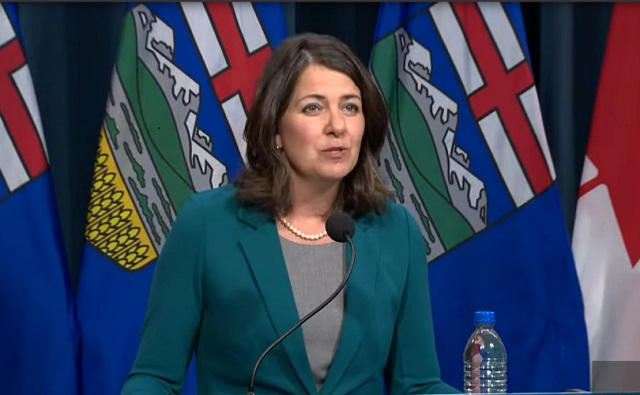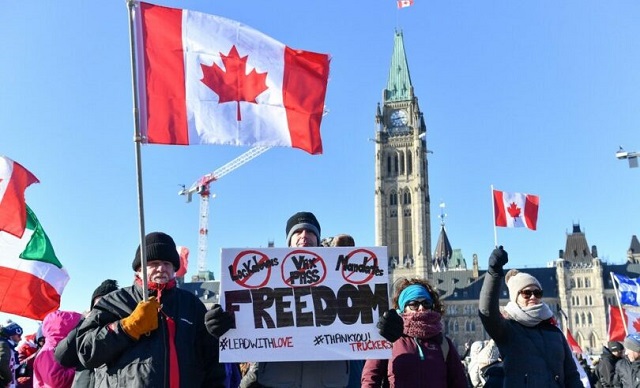Economy
Five Canadian premiers demand Trudeau scrap carbon tax for all provinces and not just a few

From LifeSiteNews
By ‘singling out Atlantic Canadians with this relief, it has caused divisions across the country. All Canadians are equally valued and should be equally respected,’ the premiers wrote
Five Canadian premiers from coast to coast banded together to demand Prime Minister Justin Trudeau drop the carbon tax on home heating bills for all provinces, saying his policy of giving one region a tax break over another has caused “divisions.”
“It is of vital importance that federal policies and programs are made available to all Canadians in a fair and equitable way,” reads a letter dated November 10 and signed by Premiers Tim Houston of Nova Scotia, Blaine Higgs of New Brunswick, Doug Ford of Ontario, Danielle Smith of Alberta, and Scott Moe of Saskatchewan.
The premiers wrote that by “singling out Atlantic Canadians with this relief, it has caused divisions across the country. All Canadians are equally valued and should be equally respected.”
In the letter, the premiers demanded a meeting with Trudeau to discuss the matter and “urge the federal government to remove the carbon tax on all forms of home heating across Canada immediately.”
“We are calling on the federal government to do the right thing and treat all Canadians fairly by removing the federal carbon tax from all forms of home heating. This would help address the significant affordability concerns faced by families from coast to coast to coast,” the premiers wrote.
“Given the vast impacts of carbon pricing, we are asking for a meeting to discuss this issue.”
Trudeau recently announced he was pausing the collection of the carbon tax on home heating oil for three years, but only for Atlantic Canadian provinces. The current cost of the carbon tax on home heating fuel is 17 cents per litre. Most Canadians, however, heat their homes with clean-burning natural gas, a fuel that will not be exempted from the carbon tax.
Trudeau’s announcement came amid dismal polling numbers showing his government will be defeated in a landslide by the Conservative Party come the next election.
Indeed, a recent poll even shows the Green Party outperforming the Liberals in Atlantic Canada.
The premiers’ letter was signed by two Atlantic provinces that benefit from the carbon tax pause but whose leaders do not think it is fair they get special treatment over the others.
The premiers warned Trudeau that with winter coming most Canadians will be hit with high heating bills thanks to the carbon tax.
“Many Canadian households do not use home heating oil and instead use all forms of heating to heat their homes. Winter is coming and these people also deserve a break. It is of vital importance that federal policies and programs are made available to all Canadians in a fair and equitable way,” the letter reads.
“The federal government was elected by voters across this country. This is an opportunity to show them that they won’t be penalized for their choice of home heating source.”
The Conservative Party of Canada (CPC) under leader Pierre Poilievre firmly opposes the carbon tax. Poilievre recently dared Trudeau to call a “carbon tax” election so Canadians can decide for themselves if they want a government for or against a tax that has caused home heating bills to double in some provinces.
A recent CPC motion calling for the carbon tax to be paused for all Canadians failed to pass after the Liberal and Bloc Quebecois MPs voted against it. This motion interestingly had support from the New Democratic Party (NDP), which means its passage is likely.
85 percent of small businesses now opposed to Trudeau’s carbon tax
Opposition to Trudeau’s carbon tax is strong and growing, notably among small business owners. Indeed, a recent poll shows that 85% of small businesses reject the federal carbon tax.
The poll, conducted by the Canadian Federation of Independent Business (CFIB), shows that opposition to the carbon tax has nearly doubled in only a year. Last year, about 52% of businesses opposed a carbon tax.
CFIB president Dan Kelly noted that “the entire federal carbon tax structure is beginning to look like a shell game.”
When it comes to small businesses, Kelly said that they pay “about 40% of the costs of the carbon tax, but the federal government has promised to return only 10% to small businesses.”
LifeSiteNews reported last month how Trudeau’s carbon tax is costing Canadians hundreds of dollars annually, as the rebates given out by the federal government are not enough to compensate for the increased fuel costs.
The Trudeau government’s current environmental goals – in lockstep with the United Nations’ “2030 Agenda for Sustainable Development” – include phasing out coal-fired power plants, reducing fertilizer usage, and curbing natural gas use over the coming decades.
The reduction and eventual elimination of the use of so-called “fossil fuels” and a transition to unreliable “green” energy has also been pushed by the World Economic Forum (WEF) – the globalist group behind the socialist “Great Reset” agenda – an organization in which Trudeau and some of his cabinet are involved.
Automotive
Governments in Canada accelerate EV ‘investments’ as automakers reverse course

From the Fraser Institute
Evidence continues to accrue that many of these “investments,” which are ultimately of course taxpayer funded, are risky ventures indeed.
Even as the much-vaunted electric vehicle (EV) transition slams into stiff headwinds, the Trudeau government and Ontario’s Ford government will pour another $5 billion in subsidies into Honda, which plans to build an EV battery plant and manufacture EVs in Ontario.
This comes on top of a long list of other such “investments” including $15 billion for Stellantis and LG Energy Solution, $13 billion for Volkswagen (with a real cost to Ottawa of $16.3 billion, per the Parliamentary Budget Officer), a combined $4.24 billion (federal/Quebec split) to Northvolt, a Swedish battery maker, and a combined $644 million (federal/Quebec split) to Ford Motor Company to build a cathode manufacturing plant in Quebec.
All this government subsidizing is of course meant to help remake the automobile, with the Trudeau government mandating that 100 per cent of new passenger vehicles and light trucks sold in Canada be zero-emission by 2035. But evidence continues to accrue that many of these “investments,” which are ultimately of course taxpayer funded, are risky ventures indeed.
As the Wall Street Journal notes, Tesla, the biggest EV maker in the United States, has seen its share prices plummet (down 41 per cent this year) as the company struggles to sell its vehicles at the pace of previous years when first-adopters jumped into the EV market. Some would-be EV makers or users are postponing their own EV investments. Ford has killed it’s electric F-150 pickup truck, Hertz is dumping one-third of its fleet of EV rental vehicles, and Swedish EV company Polestar dropped 15 per cent of its global work force while Tesla is cutting 10 per cent of its global staff.
And in the U.S., a much larger potential market for EVs, a recent Gallup poll shows a market turning frosty. The percentage of Americans polled by Gallup who said they’re seriously considering buying an EV has been declining from 12 per cent in 2023 to 9 per cent in 2024. Even more troubling for would-be EV sellers is that only 35 per cent of poll respondents in 2024 said they “might consider” buying an EV in the future. That number is down from 43 per cent in 2023.
Overall, according to Gallup, “less than half of adults, 44 per cent, now say they are either seriously considering or might consider buying an EV in the future, down from 55 per cent in 2023, while the proportion not intending to buy one has increased from 41 per cent to 48 per cent.” In other words, in a future where government wants sellers to only sell EVs, almost half the U.S. public doesn’t want to buy one.
And yet, Canada’s governments are hitting the gas pedal on EVs, putting the hard-earned capital of Canadian taxpayers at significant risk. A smart government would have its finger in the wind and would slow down when faced with road bumps. It might even reset its GPS and change the course of its 2035 EV mandate for vehicles few motorists want to buy.
Author:
Automotive
Red States Sue California and the Biden Administration to Halt Electric Truck Mandates

From Heartland Daily News
By Nick Pope
“California and an unaccountable EPA are trying to transform our national trucking industry and supply chain infrastructure. This effort—coming at a time of heightened inflation and with an already-strained electrical grid—will devastate the trucking and logistics industry, raise prices for customers, and impact untold number of jobs across Nebraska and the country”
Large coalitions of red states are suing regulators in Washington, D.C., and California over rules designed to effectively require increases in electric vehicle (EV) adoption.
Nebraska is leading a 24-state coalition in a lawsuit against the Environmental Protection Agency’s (EPA) recently-finalized emissions standards for heavy-duty vehicles in the U.S. Court of Appeals for the D.C. Circuit, and a 17-state coalition suing the state of California in the U.S. District Court for the Eastern District of California over its Advanced Clean Fleet rules. Both regulations would increase the number of heavy-duty EVs on the road, a development that could cause serious disruptions and cost increases across the U.S. economy, as supply chain and trucking sector experts have previously told the Daily Caller News Foundation.
“California and an unaccountable EPA are trying to transform our national trucking industry and supply chain infrastructure. This effort—coming at a time of heightened inflation and with an already-strained electrical grid—will devastate the trucking and logistics industry, raise prices for customers, and impact untold number of jobs across Nebraska and the country,” Republican Nebraska Attorney General Mike Hilgers said in a statement. “Neither California nor the EPA has the constitutional power to dictate these nationwide rules to Americans. I am proud to lead our efforts to stop these unconstitutional attempts to remake our economy and am grateful to our sister states for joining our coalitions.”
(RELATED: New Analysis Shows Just How Bad Electric Trucks Are For Business)
While specifics vary depending on the type of heavy-duty vehicle, EPA’s emissions standards will effectively mandate that EVs make up 60% of new urban delivery trucks and 25% of long-haul tractors sold by 2032, according to The Wall Street Journal. The agency has also pushed aggressive emissions standards for light- and medium-duty vehicles that will similarly force an increase in EVs’ share of new car sales over the next decade.
California’s Advanced Clean Fleet rules, meanwhile, will require that 100% of trucks sold in the state will be zero-emissions models starting in 2036, according to the California Air Resources Board (CARB). While not federal, the California rules are of importance to other states because there are numerous other states who follow California’s emissions standards, which can be tighter than those required by the EPA and other federal agencies.
Critics fear that this dynamic will effectively enable California to set national policies and nudge manufacturers in the direction of EVs at a greater rate and scale than the Biden administration is pursuing.
Trucking industry and supply chain experts have previously told the DCNF that both regulations threaten to cause serious problems for the country’s supply chains and wider economy given that the technology for electric and zero-emissions trucks is simply not yet ready to be mandated at scale, among other issues.
Neither CARB nor the EPA responded immediately to requests for comment.
Nick Pope is a contributor to The Daily Caller News Service.
Originally published by The Daily Caller. Republished with permission.
-

 Uncategorized2 days ago
Uncategorized2 days agoRCMP recruitment failure has Alberta advocacy group calling for Provincial Police Service
-

 Automotive16 hours ago
Automotive16 hours agoGovernments in Canada accelerate EV ‘investments’ as automakers reverse course
-

 COVID-191 day ago
COVID-191 day agoJapan’s most senior cancer doctor: COVID shots are ‘essentially murder’
-

 Health2 days ago
Health2 days agoPrivate Footage Reveals Leading Medical Org’s Efforts To ‘Normalize’ Gender Ideology
-

 Economy19 hours ago
Economy19 hours agoBiden signs suicidal ‘No Coal’ pact, while rest of world builds 1,000 new plants
-

 Health10 hours ago
Health10 hours agoSouth Korean president declares low birth rate a ‘national emergency,’ plans new ministry to address it
-

 Health2 days ago
Health2 days agoTHE WPATH TAPES: Behind-The-Scenes Recordings Reveal What Top Gender Doctors Really Think About Sex Change Procedures
-

 COVID-191 day ago
COVID-191 day agoTrudeau government only sought legal advice after Emergencies Act was invoked, records indicate









